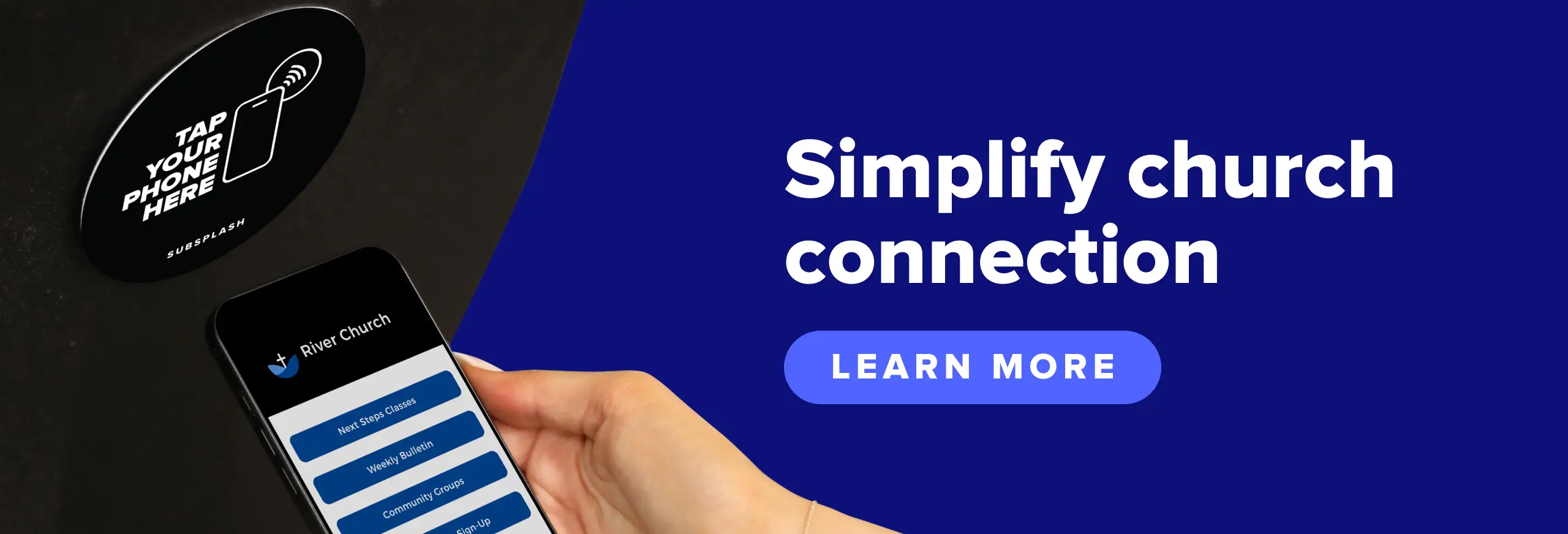Download the Church membership 101: How to join a church
Fill out the form below to schedule a demo or call our sales team at
469-564-3922

Only a few decades ago, officially joining your church was a crucial step in church membership. Back then, most churches still provided annual printed booklets as the church members’ directory. These large booklets were filled with names, phone numbers, and a proud family photo taken by the church. Due to the rise of the internet, times have changed in many ways!
Church membership today looks quite different. Many people, especially younger generations, struggle to understand what it means to be official members of a church. They’re unsure of the church membership requirements, the implications behind their commitment, or may not even know their church offers a church membership program.
On the flip side, some churches today no longer promote the importance of official church “membership.” Instead, they use “joining the church” or “church member” as catch-all phrases—usually just describing a churchgoer who consistently comes on Sundays.
That means churchgoers and church leaders alike are left confused and asking a few questions, such as:
Let’s dive into answering these important questions about how to join a church—clarifying its meaning, exploring church membership in the Bible, and uncovering why it still matters in today’s changing church landscape.

Church membership has deep roots stretching back to the early church, although it hasn’t always looked like the structured programs many churches use today. In the earliest days of Christianity, being part of the church was synonymous with being part of a close-knit spiritual family.
People were baptized, discipled, and sent into mission, all within a clearly identifiable community of believers. As the Church institutionalized over time, more formal processes emerged—such as catechism classes, written covenants, and eventually church rolls.
By the time the Protestant Reformation occurred, church membership became even more defined. Reformers emphasized the importance of believers being held accountable within a local church body. This focus on accountability led to more structured expectations for those joining a church, reinforcing the idea that membership was both a spiritual commitment and a communal responsibility. Over time, this structure evolved into more formalized processes for identifying and integrating new members.
Fast forward a few centuries later to today and much of the emphasis on membership catechesis and formalities has been lost, especially in the U.S. Instead, many churches have shifted toward more casual or consumer-driven approaches, where the focus is often on attendance and personal experience rather than covenantal commitment. As opposed to understanding Church doctrine, churches today emphasize membership or next steps classes as a means to officially join a church.
While some churches still maintain robust membership processes, others have minimized or even abandoned the concept altogether, raising important questions about belonging, accountability, and the role of the local church in a believer’s spiritual formation.
Church history proves that joining a church has always been about more than attendance—it's about belonging, accountability, community, discipleship, and a shared faith in Christ. From the days of the Apostle Paul up until today, the Church has experienced a series of transformations in regards to its membership requirements.
Many Christians today ask, "Is church membership biblical?" While you won’t find the phrase “church membership” word-for-word in Scripture, the concept is very much present. The New Testament is filled with references to people being added to the church (Acts 2:41), being part of the body (1 Corinthians 12), and being under the care and authority of elders (Hebrews 13:17).
These passages point to an organized community where believers were not only counted but also cared for and discipled. Paul’s letters, written to specific congregations, imply that the early Christians clearly knew who the members of a church were. So, church membership in the Bible isn’t a modern invention—it’s a natural outgrowth of biblical principles about community, responsibility, and spiritual growth that we see modeled in Scripture.
In short, is church membership biblical? Yes, when it’s understood as a commitment to a local body where mutual growth, discipleship, doctrine, and mission are practiced in unity.

If you’ve been attending a church and are wondering how to become a member of a church, the good news is that many churches have a clear, welcoming process in place. While each denomination or local church may vary in its steps, there are a few common elements:
This process not only helps new attendees understand church membership requirements, but it also reinforces that joining a church is a two-way relationship built on trust and shared faith.
Whether you're new to the faith or simply moving from one congregation to another, learning how to join a church is an essential step toward deeper involvement and spiritual growth. If you’re unsure, ask your church leaders about how you can become a member at your church.
Being a church member is not just a title—it comes with tangible spiritual, relational, and practical benefits. One of the clearest advantages is accountability. When you're officially part of a church body, pastors and leaders are better equipped to shepherd and support you.
Another benefit is community. You’ll have more opportunities to build relationships through small groups, serve teams, and discipleship programs. Many churches also encourage church members to participate in certain roles, such as teaching, leading a ministry, or voting on church decisions.
From a biblical perspective, being a part of a church strengthens your spiritual foundation. You receive regular teaching, encouragement, and correction—all vital for Christian maturity. Practically, you also gain clarity on how to use your spiritual gifts in the context of a local body.
So, while some may question whether church membership is really necessary, the benefits are clear. Being members of a church helps you grow deeper in your walk with Christ, while supporting and being supported by a community that shares your faith and mission.
With the onslaught of technological and cultural changes over the last thirty years, there is no longer a traditional path to church membership. In our modern age, where many people watch church services online and hop from one congregation to another, the future of church membership might look different—but its core purpose remains unchanged.
As churches reimagine how to shepherd and equip church members, they must also teach clearly on church membership requirements and help people understand how to become a member of a church with purpose.
Whether you’re a long-time believer or exploring how to join a church for the first time, don’t overlook the importance of committing to a local body of believers. Church membership isn't about status—it's about connection, commitment, and Christ-centered growth.